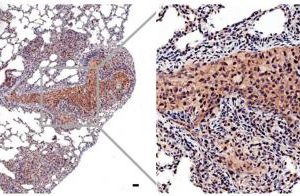cold spring harbor laboratory
Neuroscientists find overlooked brain area is an important locus of depression
Cold Spring Harbor, NY — A team of neuroscientists at Cold Spring Harbor Laboratory (CSHL), Brookhaven National Laboratory (BNL) and UC San Diego (UCSD) has collected evidence suggesting that a previously overlooked portion of the brain could be a …
CSHL scientists show in unprecedented detail how cortical nerve cells form synapses with neighbors
Cold Spring Harbor, NY– Newly published research led by Professor Z. Josh Huang, Ph.D., of Cold Spring Harbor Laboratory (CSHL) sheds important new light on how neurons in the developing brain make connections with one another. This activity, calle…
CSHL study finds that 2 non-coding RNAs trigger formation of a nuclear subcompartment
Cold Spring Harbor, N.Y. — The nucleus of a cell, which houses the cell’s DNA, is also home to many structures that are not bound by a membrane but nevertheless exist as distinct compartments. A team of Cold Spring Harbor Laboratory (CSHL) scienti…
Optical technique reveals unnexpected complexity in mammalian olfactory coding
Cold Spring Harbor, NY — A team co-led by neuroscientists at Cold Spring Harbor Laboratory (CSHL) has shed light — literally — on circuitry underlying the olfactory system in mammals, giving us a new view of how that system may pull off some of i…
Mice that ‘smell’ light could help us better understand olfaction
CAMBRIDGE, Mass. — Harvard University neurobiologists have created mice that can “smell” light, providing a potent new tool that could help researchers better understand the neural basis of olfaction.
The work, described this week in the journal …
Congressman, CSHL president urge quick action to reverse judicial embryonic stem cell research ban
Cold Spring Harbor, NY — Against a backdrop of some of the world’s most sophisticated biological research labs, Rep. Steve Israel (D-Huntington) this morning issued a challenge to his colleagues in Congress: immediately upon their return from summ…
Silent DNA architecture helps block cancer cell growth
Cancerous and precancerous cells can detect that they are abnormal and kill themselves, or remain alive indefinitely but cease proliferating, through two intrinsic processes called programmed cell death and cellular senescence. One goal of cancer chemotherapy is to help stimulate these potent antitumor processes. Researchers at Cold Spring Harbor Laboratory on Long Island have recently shown that by locking cancer cells into a permanent state in which they remain alive but can no longer proliferate, cellular senescence contributes to successful outcomes following cancer therapy. Now, the same group has uncovered a precise molecular mechanism that helps trigger the “stop growing” response of cells. The study is published in the June 13 issue of the journal Cell.
Researchers discover new breast, lung cancer gene
Scientists at Tularik Inc. and Cold Spring Harbor Laboratory have discovered a new gene that is expressed at abnormally high levels in nearly 50% of the breast cancer specimens they examined, and is similarly overexpressed in a large proportion of lung cancers (35%).
Pavlov?s Flies: Researchers Identify Fruit Fly Memory Mutants
By teaching fruit flies to avoid an odor and isolating mutant flies that can?t remember their lessons, researchers at Cold Spring Harbor Laboratory in New York have identified dozens of genes required for long-term memory. In the same study, using DNA chip technology, the scientists identified another large group of candidate memory genes that are either switched on or off in the fly brain during memory formation.


